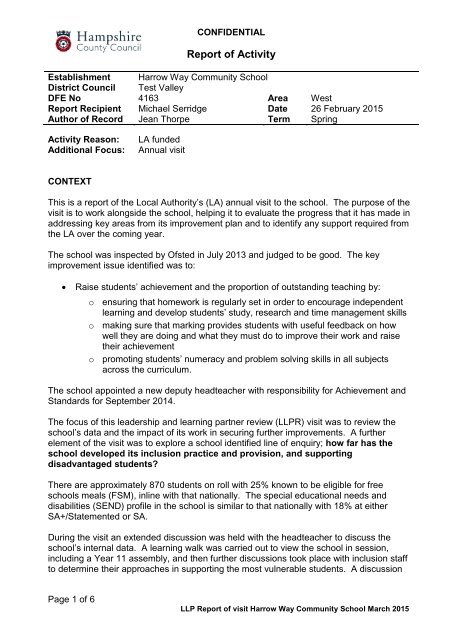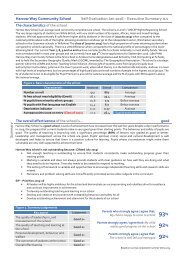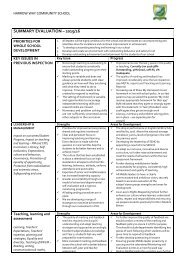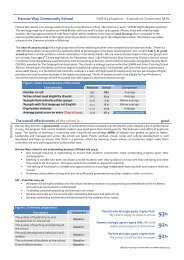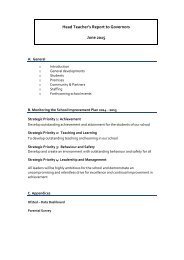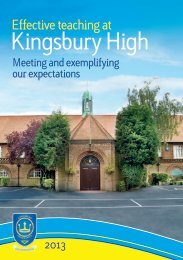Report of Activity
Create successful ePaper yourself
Turn your PDF publications into a flip-book with our unique Google optimized e-Paper software.
CONFIDENTIAL<br />
<strong>Report</strong> <strong>of</strong> <strong>Activity</strong><br />
Establishment Harrow Way Community School<br />
District Council Test Valley<br />
DFE No 4163 Area West<br />
<strong>Report</strong> Recipient Michael Serridge Date 26 February 2015<br />
Author <strong>of</strong> Record Jean Thorpe Term Spring<br />
<strong>Activity</strong> Reason:<br />
Additional Focus:<br />
LA funded<br />
Annual visit<br />
CONTEXT<br />
This is a report <strong>of</strong> the Local Authority’s (LA) annual visit to the school. The purpose <strong>of</strong> the<br />
visit is to work alongside the school, helping it to evaluate the progress that it has made in<br />
addressing key areas from its improvement plan and to identify any support required from<br />
the LA over the coming year.<br />
The school was inspected by Ofsted in July 2013 and judged to be good. The key<br />
improvement issue identified was to:<br />
<br />
Raise students’ achievement and the proportion <strong>of</strong> outstanding teaching by:<br />
o ensuring that homework is regularly set in order to encourage independent<br />
learning and develop students’ study, research and time management skills<br />
o making sure that marking provides students with useful feedback on how<br />
well they are doing and what they must do to improve their work and raise<br />
their achievement<br />
o promoting students’ numeracy and problem solving skills in all subjects<br />
across the curriculum.<br />
The school appointed a new deputy headteacher with responsibility for Achievement and<br />
Standards for September 2014.<br />
The focus <strong>of</strong> this leadership and learning partner review (LLPR) visit was to review the<br />
school’s data and the impact <strong>of</strong> its work in securing further improvements. A further<br />
element <strong>of</strong> the visit was to explore a school identified line <strong>of</strong> enquiry; how far has the<br />
school developed its inclusion practice and provision, and supporting<br />
disadvantaged students?<br />
There are approximately 870 students on roll with 25% known to be eligible for free<br />
schools meals (FSM), inline with that nationally. The special educational needs and<br />
disabilities (SEND) pr<strong>of</strong>ile in the school is similar to that nationally with 18% at either<br />
SA+/Statemented or SA.<br />
During the visit an extended discussion was held with the headteacher to discuss the<br />
school’s internal data. A learning walk was carried out to view the school in session,<br />
including a Year 11 assembly, and then further discussions took place with inclusion staff<br />
to determine their approaches in supporting the most vulnerable students. A discussion<br />
Page 1 <strong>of</strong> 6<br />
LLP <strong>Report</strong> <strong>of</strong> visit Harrow Way Community School March 2015
CONFIDENTIAL<br />
also took place with the recently appointed deputy headteacher to consider the overview<br />
and strategic development thinking around supporting disadvantaged students.<br />
The chair <strong>of</strong> governors attended the meeting with the headteacher for the feedback.<br />
COMMENTARY<br />
The school’s self-evaluation and progress<br />
Evaluation<br />
against<br />
Ofsted<br />
criteria<br />
Overall<br />
Effectiveness<br />
Achievement Quality <strong>of</strong><br />
Teaching<br />
Behaviour<br />
and<br />
Safety<br />
Leadership<br />
and<br />
Management<br />
Last<br />
Ofsted<br />
(07/13)<br />
School’s<br />
current<br />
view<br />
2 2 2 2 2<br />
2 2 2 2 2<br />
The school currently judges itself to be good across all areas, although its self-evaluation<br />
indicates that most <strong>of</strong> the areas are now stronger than when judged by Ofsted and are<br />
striving towards being judged as outstanding.<br />
The school has very robust and ongoing processes to ensure that whole evaluation takes<br />
place regularly and that all staff are clear about the ongoing priorities and areas <strong>of</strong> focus.<br />
The school’s culture <strong>of</strong> seeking to self-improve and in being committed to regular cycles<br />
<strong>of</strong> review means that there is a clear sense <strong>of</strong> direction from the most senior leaders,<br />
which is underpinned by a clear articulation <strong>of</strong> the school’s vision. Acknowledging that<br />
‘outstanding progress’, ‘high aspirations’, and ‘resilient learners’ as part <strong>of</strong> the Harrow<br />
Way DNA is the school’s aim, the school evaluates its progress against these ambitions<br />
regularly.<br />
The headteacher is clear that processes for evaluating progress across the school and<br />
determining its effectiveness must involve all middle and senior leaders, must be simple,<br />
clear and be dialogic requiring discussion and explanation across all groups <strong>of</strong> staff and<br />
departments, to ensure areas for improvement are known and understood. A recent<br />
example <strong>of</strong> this is the identification that assessment practices needed to improve since<br />
there was too much variation and that effective marking and feedback were not well<br />
enough embedded. Following whole school development, this has now been improved;<br />
regular ‘marketplace showcases’ take place in the library to share samples <strong>of</strong> quality<br />
marking to ensure greater consistency. Middle leaders also undertake work sampling,<br />
and the outcomes <strong>of</strong> this fed back to the senior leadership team.<br />
The headteacher rightly recognises the need to ensure that middle leader Head <strong>of</strong><br />
Departments’ self-evaluation is as strong and accurate as that at senior leader level. The<br />
school therefore has in place a middle leader secondment programme whereby staff join<br />
the senior leadership team (SLT), enabling them to have greater awareness <strong>of</strong> the core<br />
Page 2 <strong>of</strong> 6<br />
LLP <strong>Report</strong> <strong>of</strong> visit Harrow Way Community School March 2015
CONFIDENTIAL<br />
decision making process at school but also to replicate the level <strong>of</strong> improvementthoroughness<br />
within their department. At least seven staff have benefitted from this<br />
programme. The rigour <strong>of</strong> line management is strong and supports consistent<br />
expectation <strong>of</strong> all staff. The headteacher is visible and views his involvement in the dayto-day<br />
life <strong>of</strong> the school as being critical to supporting and challenging staff and students.<br />
He acknowledges that the leadership <strong>of</strong> the school will be further enhanced by some<br />
greater delegation, particularly within governance, and that this will further raise levels <strong>of</strong><br />
accountability.<br />
Improving and focusing on high quality teaching and learning is seen by all as being<br />
fundamental to the school’s continued success; teaching is judged to be at least good<br />
through the school with much <strong>of</strong> it outstanding. Discussion about teaching and learning is<br />
frequent and acknowledged to be the school’s core business. Regular teaching and<br />
Learning Summary <strong>Report</strong>s following systematic evaluation are shared with staff and the<br />
governing body and highlight areas <strong>of</strong> strength but also areas for development. This<br />
feeds in to bespoke and whole school continued pr<strong>of</strong>essional development (CPD).<br />
Developments to the school’s approach to CPD now include both whole school and staff<br />
specific workshops, combined with regular feedback. The lead for CPD also line<br />
manages the school’s lead practitioners which ensures a balanced approach to both<br />
subject specific elements as well as excellence in teaching.<br />
Behaviour and safety is good; attendance has improved over the past three years as<br />
have exclusion rates and in-school behaviour. The school’s work on sharing the<br />
development <strong>of</strong> its ethos, together with the focus on the rights respecting work has<br />
contributed to staff and students drafting the school’s core values. Appointing two<br />
assistant Year Leaders is reported to have assisted in improving day-to-day student<br />
behaviour, preventing escalation <strong>of</strong> incidents and ensuring that the focus on learning is<br />
regained quickly. Attendance currently stands at 94.6% and persistent absenteeism has<br />
been reduced to under 4.8% (2013/14) and below the national figure <strong>of</strong> 5.8%. Fixed term<br />
exclusions have also improved markedly from 19% in 2013/14 to 7.9% to date during<br />
2014/15. The school is committed to maintaining this low level <strong>of</strong> exclusion.<br />
Pupil progress and attainment<br />
Outcomes for 2014 were strong and considerably improved over 2013; 5A*-C EM was<br />
61%, 6% above national attainment, and similarly above for most student groups.<br />
Attainment in English was particularly high, and also strong in humanities, art and<br />
performing arts, as well as some areas <strong>of</strong> science. Attainment was weaker in design and<br />
technology (D&T). This group <strong>of</strong> students’ prior attainment was below that nationally and<br />
therefore the students’ progress is strong. Overall value-added score <strong>of</strong> 1004.7 places<br />
the school’s progress above expectations and significantly so for English, languages and<br />
humanities. Expected and exceeding expected progress measures for English are very<br />
strong at 85% and 47% respectively, 15% above that nationally for each indicator. In<br />
mathematics the measure is also above that nationally by approximately 5% at 70% and<br />
33%. The school has identified that although in all subjects pupils make progress in line<br />
with that nationally, there remains some underperformance in science (core), D&T<br />
resistant materials/graphics, PE and English Literature.<br />
Page 3 <strong>of</strong> 6<br />
LLP <strong>Report</strong> <strong>of</strong> visit Harrow Way Community School March 2015
CONFIDENTIAL<br />
The school is aware that 2014 outcomes were affected by a small number <strong>of</strong> students<br />
who were educated <strong>of</strong>f-site, and continues to work closely with external provision to<br />
ensure more effective support and intervention.<br />
A number <strong>of</strong> changes have been implemented to support improvement this year; the<br />
development <strong>of</strong> lead practitioners in core subjects is enabling a strong drive to support<br />
behaviour for learning as well as focus on continuous improvement in teaching and<br />
learning. A number <strong>of</strong> new middle leader roles have been appointed and with school<br />
induction are beginning to influence and contribute to the wider school effectiveness. A<br />
new head <strong>of</strong> department in technology, <strong>of</strong> food, and <strong>of</strong> ICT have been appointed.<br />
Improvements in science are steady; coursework results in physics and chemistry are<br />
looking strong, and matching that historically <strong>of</strong> biology. The school is rightly planning to<br />
ensure it is well prepared for the Progress 8 measure, appointing more staff in humanities<br />
including a second in department.<br />
The current year 11’s attainment <strong>of</strong> entry was overall significantly below national levels<br />
and slightly below that <strong>of</strong> the previous year; 26% are considered to be performing in the<br />
lower prior attainment band compared with 16% nationally. The school predicts<br />
approximately 60% will achieve 5A*-CEM. Analysis to date indicates that students are<br />
making good progress and that at least 85% in English and 72% in mathematics will<br />
make at least three levels <strong>of</strong> progress. This will consolidate the high expectations <strong>of</strong> the<br />
school and endorse the rigorous evaluation systems in place.<br />
Evaluation <strong>of</strong> Key Stage 3 indicates that attainment will further strengthen in both English<br />
and in particular mathematics; the school is predicting a neutral Progress 8 measure for<br />
2016 and +0.5 for 2017.<br />
Support for more vulnerable students<br />
The 5A*-C EM attainment gap between disadvantaged and other students began to close<br />
in 2014 to 20%. The school has a programme <strong>of</strong> support and mentoring for students in<br />
receipt <strong>of</strong> Pupil Premium, which is supporting accelerated progress. The school predicts<br />
that the attainment gap will further reduce in 2015 to 15-18%. Analysis <strong>of</strong> the impact <strong>of</strong><br />
this through Key Stage 3 indicates that progress in English and mathematics between<br />
disadvantaged and non-disadvantaged students will close to approximately 6%.<br />
The school has four children in care (CiC) students.<br />
Discussion with the team supporting inclusion explored the range <strong>of</strong> strategies in place to<br />
support the range <strong>of</strong> student needs. Linking the SEND needs and interventions with<br />
parent support advisor and welfare assistant support, as well as aspects <strong>of</strong> the Flexible<br />
Learning Centre enables the school to have a more holistic view and access to a range <strong>of</strong><br />
strategies to ensure greater support. The use <strong>of</strong> inclusion mapping outlining a hierarchy<br />
<strong>of</strong> needs and analyses supports fortnightly inclusion meetings involving heads <strong>of</strong> year and<br />
pastoral leads. The team acknowledges the positive impact <strong>of</strong> the recently appointed<br />
assistant Year Leads in supporting students’ pastoral needs more effectively, and<br />
proactively, enabling Year Leaders to concentrate <strong>of</strong> student progress rather than<br />
behaviour.<br />
Page 4 <strong>of</strong> 6<br />
LLP <strong>Report</strong> <strong>of</strong> visit Harrow Way Community School March 2015
CONFIDENTIAL<br />
The use <strong>of</strong> an internal exclusion room has developed, with greater focus now on ensuring<br />
it provides alternative provision. The school‘s data shows that Year 11 exclusions are<br />
higher in 2015 than Year 11 students last year but that the number <strong>of</strong> days lost has<br />
halved, indicating a shift in culture across the school.<br />
The progress <strong>of</strong> SEND students is not yet sufficiently high; whilst attainment at School<br />
Action level is broadly in line with national expectations for 5A*-CEM measure, those at<br />
School Action plus (SA+) are below, although attainment in English is stronger. The<br />
SEND team has identified that the combined SA+/FSM pr<strong>of</strong>ile is <strong>of</strong> particular concern and<br />
these students have been targeted as they join the school at Year 7 and into Year 8. A<br />
range <strong>of</strong> commercial approaches is being used, as well as intervention teaching<br />
strategies, including homework sessions, precision teaching, a focus on literacy and<br />
language skills, as well as close monitoring <strong>of</strong> behaviour and attendance. The range <strong>of</strong><br />
outreach support for this group <strong>of</strong> pupils has now been extended. The school has a<br />
number <strong>of</strong> positive case studies, which can exemplify the impact <strong>of</strong> this work, but<br />
recognises that further work is required. The school is clear that improved linking <strong>of</strong><br />
strategies and approaches used across primaries in to secondary needs to be more<br />
robust with higher expectations <strong>of</strong> the adult pr<strong>of</strong>essionals and students’ engagement.<br />
Work has been established with the feeder schools to address this more coherently.<br />
The recently appointed deputy headteacher is exploring the school’s approach to<br />
supporting the most disadvantaged students. Work to date has focused on developing a<br />
greater understanding that a tighter and more holistic view needs to be held <strong>of</strong> these<br />
students in terms <strong>of</strong> their parental engagement, the independence <strong>of</strong> them as learners,<br />
their literacy skills, and their mental and emotional health and well-being, and that this<br />
information and approach needs to be better understood across the whole school on a<br />
student by student basis. The emerging view is that this work will then link more closely<br />
to that <strong>of</strong> the current inclusion practices and result in raised aspirations for these students<br />
at the outset. It is expected that this work will sharpen the work <strong>of</strong> support staff working<br />
with these students, increase the pace <strong>of</strong> literacy interventions, and raise the<br />
understanding <strong>of</strong> what students require beyond <strong>of</strong>fering with the school has access to.<br />
This work is ambitious but appropriately aspirational and will fine-tune the approaches<br />
and the provision that the school already has in place. It is envisaged that a team <strong>of</strong> staff<br />
will support this work with the deputy headteacher.<br />
School improvement priorities<br />
The Strategic Improvement Plan is in place and has identified appropriate areas for<br />
development in line with the Ofsted priorities and in support <strong>of</strong> the school’s work towards<br />
being an outstanding school. A continued focus on improving achievement for all student<br />
groups underpinned by developing teaching and learning is at the core <strong>of</strong> the school’s<br />
work.<br />
Priority for support<br />
The school continues to be a low priority for LA support, due to its improved<br />
achievement, its strong approaches to self-evaluation and evidenced commitment to<br />
improve.<br />
Page 5 <strong>of</strong> 6<br />
LLP <strong>Report</strong> <strong>of</strong> visit Harrow Way Community School March 2015
CONFIDENTIAL<br />
ACTION<br />
In addition to the school’s priority to raise achievement for all students, the following<br />
aspects are identified:<br />
<br />
<br />
Further develop the approaches, expectations and provision, for the more<br />
disadvantaged students, building on and refining the inclusion work,<br />
Explore opportunities to strengthen accountability for further leadership delegation,<br />
particularly with regards to governance.<br />
Signed:<br />
Date:<br />
Copy To:<br />
Headteacher<br />
Chair <strong>of</strong> Governors<br />
David Hardcastle (AD)<br />
Ann Truman (SIM)<br />
Jean Thorpe (LLP)<br />
Author <strong>of</strong> Record<br />
Duration Preparation Follow Up Charge Code<br />
Day(s) 1<br />
Hour(s)<br />
Total Time Author <strong>of</strong> Record Day(s) Hour(s)<br />
1<br />
Page 6 <strong>of</strong> 6<br />
LLP <strong>Report</strong> <strong>of</strong> visit Harrow Way Community School March 2015


